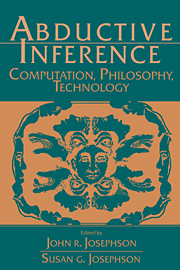Book contents
- Frontmatter
- Contents
- Contributors
- Introduction
- 1 Conceptual analysis of abduction
- 2 Knowledge-based systems and the science of AI
- 3 Two RED systems – abduction machines 1 and 2
- 4 Generalizing the control strategy – machine 3
- 5 More kinds of knowledge: Two diagnostic systems
- 6 Better task analysis, better strategy – machine 4
- 7 The computational complexity of abduction
- 8 Two more diagnostic systems
- 9 Better task definition, better strategy – machine 5
- 10 Perception and language understanding
- Appendix A Truth seekers
- Appendix B Plausibility
- Extended Bibliography
- Acknowledgments
- Index
Appendix B - Plausibility
Published online by Cambridge University Press: 08 October 2009
- Frontmatter
- Contents
- Contributors
- Introduction
- 1 Conceptual analysis of abduction
- 2 Knowledge-based systems and the science of AI
- 3 Two RED systems – abduction machines 1 and 2
- 4 Generalizing the control strategy – machine 3
- 5 More kinds of knowledge: Two diagnostic systems
- 6 Better task analysis, better strategy – machine 4
- 7 The computational complexity of abduction
- 8 Two more diagnostic systems
- 9 Better task definition, better strategy – machine 5
- 10 Perception and language understanding
- Appendix A Truth seekers
- Appendix B Plausibility
- Extended Bibliography
- Acknowledgments
- Index
Summary
Throughout this book we have depended in numerous ways on the idea of plausibility. It appears as “confidence value,” “symbolic plausibility value,” “degree of certainty,” “plausibilities of elementary hypotheses,” and the like.
Just what is this idea of plausibility? Can it be made precise? Is a plausibility a kind of likelihood, a kind of probability? What are the semantics? How much plausibility should be set for a given hypothesis under given circumstances? Is an objective standard possible? Does it even matter for a theory of intelligence, or for epistemology? Unfortunately, we cannot yet give definite answers to these questions.
The plausibility talk in this book is, in the first place, naturalistic. People mention plausibility when they describe their reasoning processes and when they write discussions of results in scientific papers. Plausibility talk seems to come naturally to us and is reflected in our ordinary language. Common usage allows both categorical judgments that something is or is not plausible, and graded comparative judgments, such as that one thing is “a lot” or “a little bit” more plausible than another. Throughout the work that we describe in this book we used our best judgments of when hypotheses were plausible, of how to evaluate evidence, and of how to weigh hypotheses. We were encouraged in our judgments by other people being likewise persuaded by appeals to “because it is the only plausible explanation,” and “more plausible than any other explanation for the data,” and the like. We were encouraged by the systems we built acting mostly according to our expectations, and producing correct answers.
Information
- Type
- Chapter
- Information
- Abductive InferenceComputation, Philosophy, Technology, pp. 266 - 272Publisher: Cambridge University PressPrint publication year: 1994
